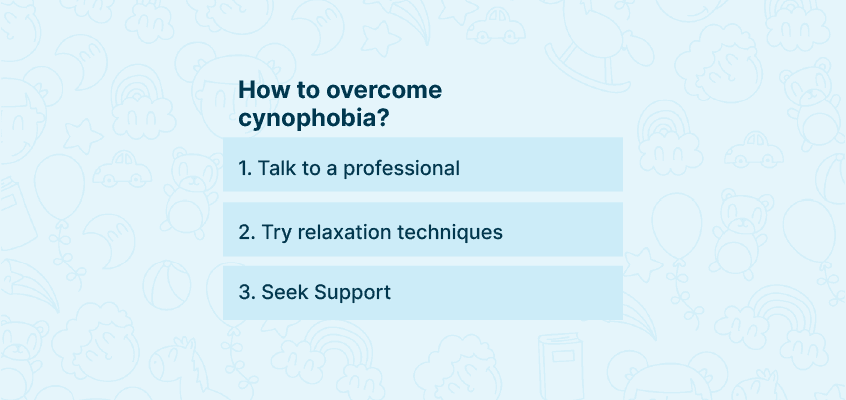Introduction
A phobia is an anxiety disorder characterised by an irrational fear of a specific object, situation, or activity. Phobias can be highly debilitating and can interfere with daily life. Phobia related to animals is quite prevalent, and in this article, we will learn more about cynophobia – fear of dogs.
Our Wellness Programs
What is cynophobia?
Cynophobia is an extreme and overwhelming fear of dogs. It is a widespread specific phobia that affects around one in fifty people. Although dogs can trigger anxiety, it is often associated with larger breeds.
Although phobias of snakes and spiders are more common, you are more likely to encounter dogs in daily life. Thus, cynophobia is a more problematic and disabling phobia. It hinders everyday life as people who have cynophobia avoid going to any place where there is a likelihood of encountering a dog, and dogs can be everywhere! It also impacts their social life, as they do not visit friends or relatives who have pet dogs.

Looking for services related to this subject? Get in touch with these experts today!!
Experts

Kirti Bajpai

India
Psychologist
Experience: 5 years

Neelam Parwani

India
Life Coach
Experience: 5 years

Mansi Chawla

India
Psychologist
Experience: 12 years
What are the causes of cynophobia?
The fear of dogs can be traced back to several different causes. It happens due to some negative experiences with dogs, especially during childhood. For some people, it may be the result of a traumatic experience, such as being bitten by a dog or even a big dog growling at you when you were a child can be enough to elicit a permanent fear for dogs.
The causes of cynophobia can also be indirect. Your parent warning you often to stay away from strange dogs during childhood can lead to an everlasting impression that dogs are dangerous. Similarly, a very unpleasant experience of a close relative or friend with dogs can also cause fear in you.
A combination of genetic and environmental factors causes phobia. So, if any of your family members suffer from cynophobia, you are at an increased risk for it. People with certain mental conditions, such as autism, depression, etc., are also more likely to have phobias.
What are the symptoms of cynophobia?
Symptoms of cynophobia and their severity vary from person to person. Some can be fearful of only large dogs, some cannot even tolerate watching dogs on screen, and some get uncomfortable only when encountering a dog in person.
Listed below are some common symptoms of this phobia:
- Sweating
- Dizziness
- Heart palpitations
- Nausea or vomiting
- Tremors
- Freezing due to fear
- Fear of impending danger
- Fear of dying
- Running away
- Hiding
- Difficulty breathing
- Excessive anxiety
How to overcome cynophobia?
There is no need to feel ashamed or embarrassed if you have cynophobia. You are not alone. Statistics show that 7%-9% of people have a specific phobia. Fortunately, cynophobia is easily manageable, and there are many treatment methods available that can help you overcome your fear. Here is a step-by-step guide on how to overcome cynophobia:
- Talk to a professional: The first step in overcoming cynophobia is to talk to a professional. It could be a therapist, counsellor, or psychologist. They will help you understand the cause of your fear and recommend the best course of treatment. Let us know more about the different treatment options available.
- Exposure therapy: Also known as desensitisation, this form of treatment aims at decreasing your sensitivity towards your object of fear. Exposure therapy is one of the most effective treatments for cynophobia. It involves gradually exposing yourself to dogs with increasing proximity and duration till you learn to tolerate and even enjoy dogs.
Your professional might ask you to start by holding toy dogs, watching videos featuring dogs, or vividly imagine yourself interacting with a dog and learning to control your response by measures such as breathing techniques, etc. With the advent of virtual reality, therapists use VR to create sounds and visual effects to help you have a more realistic experience with a dog, but in a safe and controlled environment.
As you start getting more comfortable with dogs, you can go a step further and interact with dogs in person, first from a distance, then petting the dog with the leash on, and then interacting without the leash.
- Cognitive-behavioral Therapy (CBT): Cognitive behavioural therapy often treats phobias. It involves identifying and changing the thoughts and beliefs that contribute to your fear. CBT tries to retrain the brain and help you have more control and confidence in handling challenging situations.
- Psychotherapy is a talk therapy where the psychologist will converse with you and try to delve deep into the root cause of your fear and guide you on ways to overcome it.
- Medications: Medications can be used with therapeutic techniques to treat cynophobia. Doctors may prescribe anti-anxiety medications to control the physical symptoms of phobia. But you should take them under medical supervision.
- Try relaxation techniques: You can also try some relaxation techniques yourself. These could involve deep breathing exercises, meditation, or yoga. These techniques can help you calm down and manage your fear in a better way.
- Seek Support: Finally, don’t be reluctant to seek support from your friends and family. They can offer you emotional support and understanding during your journey to overcome cynophobia.
Conclusion
Please do not hesitate to seek professional help if you have cynophobia. It is a treatable condition, and you need not live with it. The right kind of treatment can help you easily overcome your fear.
Visit unitedwecare.com to learn more about phobias and their management.
















